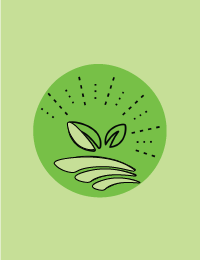Name of Organization: Zelenata Porta (Green Gate) Farm
Region of Operation: Dobri Dol, Parvomai
Size of cultivation: 0,4 ha
Years of cultivation: 6
The bio farm was created by a young family originally from Dobrich. They moved into the small village of Dobri Dol (near Plovdiv) and turned the abundant 4 decare yard into an oasis via methods of sustainable production and permaculture. They produce several types of vegetables which are selected as per their adaptive qualities and are grown seasonally in the open. Those vegetable include spinach, reddish, lettuce, green onion and garlic, cucumbers, zucchini, egg plants, peppers etc.
The young producers are rather enthusiasts than professional farmers. They have agricultural education or background but have completed a training course in permaculture design and imply the sustainability principles in the gardening and their everyday life.
They dedicate special care for soil enrichment and structure enhancement. Some of the permaculture design principles include learning from nature and attempting to sustain harmony in a way that regeneration of degraded land is enabled as well as creation of natural food systems. Permaculture science is a mix of various research fields such as soil science, hydrology and engineering, biology, geology, climatology, botanic etc. The permaculture is centered around five main elements: 1) water cycle; 2) sector analysis of the areas in regard to the impact of sun, wind, rain, flood zones, fire danger, landscape view, wild life, etc., 3) zone planning 4) workflows and 5) access[1]
The farmers transport on a weekly bases their produce to a local farmers’ market in Plovdiv. They also make home deliveries upon request and already have a list of regular subscribers who are benefiting from the convenience of this option.
An interesting innovation implemented by them is the so-called “chicken tractor”: a groups of hens are kept in a closed cage without floor and are consequently moved from one area to another on the farm plot. They forage the fresh vegetation eating also bugs, slugs, snails and other pests and produce manure that serves as a natural fertilizer rich in nitrogen and phosphorus. In addition, the chickens are scratching and surface ground similar to a tiller, leaving a patch of land ready for planting.
The Green Gate also organizes short training classes in sustainable gardening, forestry and environmental protection. The groups are up to 15 and the participants are expected to take part in agricultural activities, discussions and training in permaculture design.[2]
Source: https://agrovestnik.com
[1] https://www.permaculturenews.org/2017/09/05/permaculture-design-5-steps/
